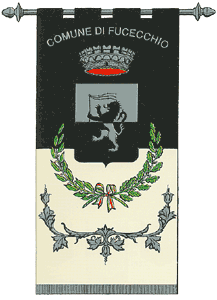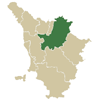|
 Inhabitants in 1991: 20.540 Inhabitants in 1991: 20.540
 The
municipal territory of Fucecchio extends for 65,13 square kilometres in
the plains of Valdarno Inferiore, between the same name marshes and the
Arno. It had its origins as a feudal centre; then Medieval Podesta
Office, and became Seat of the Community in 1774. The
municipal territory of Fucecchio extends for 65,13 square kilometres in
the plains of Valdarno Inferiore, between the same name marshes and the
Arno. It had its origins as a feudal centre; then Medieval Podesta
Office, and became Seat of the Community in 1774.
Of this capital there is certain mention from the X century.
Around the year 1000 the Lords were the Counts Cadolingi di
Borgo Nuovo; on the death of the last of these Ugo in 1113, the
centre passed partly to the Upezzinghi di Pisa and partly to the Episcopate
of Lucca; in 1187 however Emperor Enrico VI conceded to the Fucecchio
men to build a castle without any payment of property, freeing them
from any type of subjection they may have had in that moment; this demonstrated
the acquisition of a sort on autonomy confirmed by the fact
that gradually in the course of the following centuries Fucecchio grew
in importance (thanks also to its position on the Via Francigena)
enlarging its own dominion over numerous neighbouring rural communities
surrounding it.
In 1260 following the Ghibellina victory at Montaperti, Fucecchio
gave safe shelter for the exiting Fiorentini Guelfi,
and did so again in 1315 after the battle of Montecatini.
In 1323 when the castle by now gravitated into the Fiorentina
political orbit, Castruccio Castracani Lord of Lucca occupied
it by a trick : but after a few hours was forced to flee for the
violent counter attack by the town folk, one of whom it seems even
managed to wound him in the face with a blow from a bill hook. Two years
later the castle again gave refuge to part of the Fiorentino army defeated
at Altopascio; in 1330 lastly , together with Castelfranco
and Santa Croce, Fucecchio asked to come under the Fiorentina jurisdiction
and remained with it since then. Under the Medici, the Fucecchio
marshes became, as well as for the community which lived there, a place
for hunting and fishing for the sovereign and the court and tried
to transform it into a lake; the land reclamation of the marshes was
achieved by Pietro Leopoldo in 1778 with the lowering of the weir.
During the Italian Risorgimento, Giuseppe Montanelli (1813-1862) from
Fucecchio played a primary role in the regional events. During the course
of the second world war the town suffered damage and losses.
Places to visit:
Palazzo of the Podesta, enriched by a portico and the coats
of arms on the facade.
Town Hall. rich which an historical
archive with Medieval parchments.
S. Giovanni Battista,
ancient collegiate, it was radically transformed in the XVIII century.
Houses precious works of art. |
Historical info reproduced upon authorization of Regione Toscana - Dipartimento della Presidenza E Affari Legislativi e Giuridici
Translated by Ann Mountford |